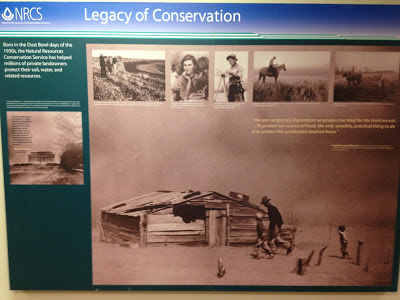
I spent this past week in Washington, D.C., with the Indiana Agricultural Leadership Program. We met with Senators, Congressmen, farm industry and environmental lobbyists, and executive agency officials. Though this was not my first visit to D.C., the past week was eye-opening for a number of reasons. There were a few recurring themes I heard over and over this week I thought I would share.
1.
Direct Payments Are Dead. Long Live Crop Insurance. Almost everyone I spoke to said the same thing--direct payment subsidies to farmers are not politically feasible in an era of belt tightening. I expect them to be eliminated or significantly reformed in the next Farm Bill. Direct payments will likely continue under NRCS conservation programs, but such payments will be tied directly to conservation programs.
Crop insurance, on the other hand, seems to enjoy strong support on Capitol Hill. The 2012 drought has demonstrated the value of the federal crop insurance program in rough years. Look for crop insurance programs to remain strong, or even strengthen if direct payments are phased out.
 |
| Senator Joe Donnelly |
2.
There Will Be a Farm Bill in 2013. More than almost any other topic, agriculture shares bipartisan support from both houses in Congress. That makes a Farm Bill low hanging fruit for Congress to demonstrate to voters that Washington is not as dysfunctional as the Sequestration theatrics would lead us all to believe. Every politician or agency official expressed support for the Farm Bill. There are details still to work out, but the public's hunger to see Washington do
something bipartisan
will push it over hill.
A side note: I was not aware how much
the debate over reforming milk pricing and marketing has been a road block to passing a Farm Bill. Margin insurance and supply management are significant changes in dairy policy--apparently too significant for many in the House to accept at this time.
3.
Immigration Reform Will Come in 2013. Mitt Romney's inability to win more than 27% of the US Hispanic vote has been a wake up call for many Republicans in Congress to reevaluate their stance on immigration. Agriculture has more to gain from immigration reform than any other industry, as it relies heavily on seasonal and migrant workers. American Farm Bureau is supporting a plan for comprehensive immigration reform to help US agriculture meet labor demands: (
Farm Bureau Urges New Ag Labor Guestworker Program). Look for immigration reform in 2013, probably even sooner than a Farm Bill.
 |
| Senator Dan Coats |
4.
Deficit Reduction Will Come . . . Someday. Nearly everyone in Washington we met seemed to agree that federal spending needs to be brought in line with revenues. Of course, no one can agree on how to reduce spending or increase revenue and when such changes in the budget should occur. Is it any wonder that we are left with sequestration--a tool that makes everyone equally as unhappy and able to blame someone else?
Finally, I learned that a working democracy is a messy business. The founders designed the legislative process to be slow, thoughtful, and filled with lively debate. However cumbersome this process appears, it is better than the alternative the founders sought to avoid--decisions made by one person with no public input. Keeping that perspective, things are actually working in D.C.
 |
| Indiana Agricultural Leadership Program 2013. Left to right: Kari Keller-Steele, Tamilee Nennich, Aaron Howell, Nikki Hall, Cheyenne Allen, Shannon Dalton, Scott Gabbert, Ryan Law, Eric Reed, Andy Utterback, Danica Kirkpatrick, Jim Bishop, Courtney Knupp, Beth Archer (center), Todd Greenwood, Carey Mawbey, Todd Janzen, Jamie Price, Amy Cornell, Clark Jordan, Dave Wyeth, Patrick Bell, Jiqin Ni, Aaron Grant, Cynthia Adam, Bethany Gremel, Jeff Jones, Chad Cass, Lynn Campbell, Adam Meyers, Cody Gault |
 |
| USDA - 12th and Independence |
 |
| A poster at NRCS: Legacy of Conservation |
 |
| The real Mall of America on a bright sunny February day. |
 |
| Plaque that appears in USDA headquarters. |
 |
| The Capitol steps. |
By Todd Janzen
 I spent this past week in Washington, D.C., with the Indiana Agricultural Leadership Program. We met with Senators, Congressmen, farm industry and environmental lobbyists, and executive agency officials. Though this was not my first visit to D.C., the past week was eye-opening for a number of reasons. There were a few recurring themes I heard over and over this week I thought I would share.
I spent this past week in Washington, D.C., with the Indiana Agricultural Leadership Program. We met with Senators, Congressmen, farm industry and environmental lobbyists, and executive agency officials. Though this was not my first visit to D.C., the past week was eye-opening for a number of reasons. There were a few recurring themes I heard over and over this week I thought I would share.








No comments:
Post a Comment
Note: Only a member of this blog may post a comment.